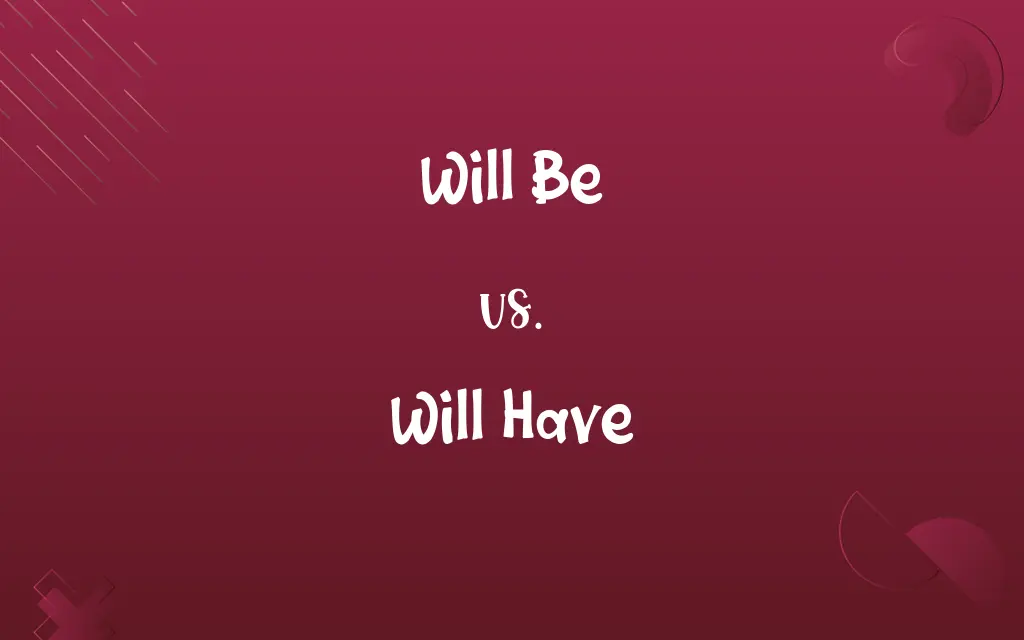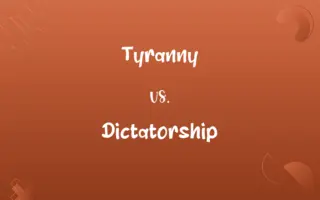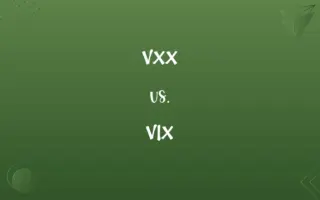Will Be vs. Will Have: Know the Difference

By Shumaila Saeed || Published on February 19, 2024
"Will Be" is a future tense verb form used to describe a state or condition that is expected to occur. "Will Have" is a future perfect tense verb form indicating possession, completion, or attainment of something in the future.

Key Differences
"Will be" is used to describe a future state or condition, indicating what something or someone will become or how they will be. "Will have," however, denotes future possession or completion of an action, emphasizing the attainment or conclusion of something.
Shumaila Saeed
Feb 19, 2024
"Will be" suggests an ongoing state in the future, without specifying the completion of an action. In contrast, "will have" implies a completed action by a certain future time, often used to express a sense of achievement or possession.
Shumaila Saeed
Feb 19, 2024
"Will be" is commonly used in predictions and descriptions of future events or states. "Will have," on the other hand, is often used to talk about future milestones or achievements that will have been reached.
Shumaila Saeed
Feb 19, 2024
When forming questions, "will be" inquires about future states or conditions (e.g., "Will you be at the party?"), whereas "will have" asks about future accomplishments or possessions (e.g., "Will you have completed the report?").
Shumaila Saeed
Feb 19, 2024
Both "will be" and "will have" imply a degree of certainty about the future, but "will have" often carries a stronger implication that the action will not only occur but will be completed.
Shumaila Saeed
Feb 19, 2024
ADVERTISEMENT
Comparison Chart
Indicates
State or condition in the future.
Completion or possession in the future.
Shumaila Saeed
Feb 19, 2024
Temporal Focus
Ongoing state without specific completion.
Completion of an action by a specific future time.
Shumaila Saeed
Feb 19, 2024
Common Usage
Predictions and descriptions of future states.
Achievements and milestones to be reached.
Shumaila Saeed
Feb 19, 2024
Example in Question Form
"Will you be there?" (Inquiring about presence)
"Will you have finished?" (Inquiring about completion)
Shumaila Saeed
Feb 19, 2024
ADVERTISEMENT
Will Be and Will Have Definitions
Will Be
"Will be" is often used in predictions about the future.
It will be cold tonight.
Shumaila Saeed
Jan 24, 2024
Will Have
"Will have" suggests an accumulation of something over time.
By next month, I will have saved enough money.
Shumaila Saeed
Jan 24, 2024
Will Be
"Will be" indicates someone's or something's future presence or existence.
She will be at the meeting.
Shumaila Saeed
Jan 24, 2024
Will Have
"Will have" can imply experiences one will have undergone.
By then, she will have traveled to six countries.
Shumaila Saeed
Jan 24, 2024
Will Be
"Will be" is used to talk about someone's future role or position.
He will be the team leader.
Shumaila Saeed
Jan 24, 2024
ADVERTISEMENT
Will Have
"Will have" denotes possession of something in the future.
She will have the keys.
Shumaila Saeed
Jan 24, 2024
Will Be
"Will be" describes a future state or condition.
Tomorrow will be sunny.
Shumaila Saeed
Jan 24, 2024
Will Have
"Will have" expresses an achievement or milestone to be reached.
He will have graduated by next year.
Shumaila Saeed
Jan 24, 2024
Will Be
"Will be" expresses a condition or situation in the future.
The streets will be crowded.
Shumaila Saeed
Jan 24, 2024
Will Have
"Will have" indicates the completion of an action by a future time.
They will have finished the project by Friday.
Shumaila Saeed
Jan 24, 2024
Repeatedly Asked Queries
Can 'will be' denote a future action?
'Will be' can denote future actions but focuses more on state or condition.
Shumaila Saeed
Feb 19, 2024
Is 'will have' used for future arrangements?
'Will have' is more about completion or possession, not arrangements.
Shumaila Saeed
Feb 19, 2024
What is the function of 'will have'?
'Will have' indicates future possession, completion, or achievement.
Shumaila Saeed
Feb 19, 2024
Can 'will have' indicate future experiences?
Yes, 'will have' can indicate experiences one will have undergone by a future time.
Shumaila Saeed
Feb 19, 2024
Does 'will have' always imply possession?
Not always; it can also imply completion or experience.
Shumaila Saeed
Feb 19, 2024
What does 'will be' imply?
'Will be' implies a future state, condition, or presence.
Shumaila Saeed
Feb 19, 2024
How does 'will be' express future predictions?
'Will be' is often used to predict future states or conditions.
Shumaila Saeed
Feb 19, 2024
Does 'will have' imply certainty?
Yes, 'will have' implies a high degree of certainty about future events.
Shumaila Saeed
Feb 19, 2024
Is 'will be' used in passive constructions?
Yes, 'will be' is commonly used in future passive constructions.
Shumaila Saeed
Feb 19, 2024
Can 'will be' refer to future roles?
Yes, 'will be' can refer to someone's future role or position.
Shumaila Saeed
Feb 19, 2024
How does context affect the use of 'will be'?
Context can determine whether 'will be' refers to a state, action, or condition.
Shumaila Saeed
Feb 19, 2024
How is 'will be' used in questions?
'Will be' is used in questions to inquire about future states or conditions.
Shumaila Saeed
Feb 19, 2024
Is 'will have' used in conditional sentences?
'Will have' can be used in conditional sentences, especially in the main clause.
Shumaila Saeed
Feb 19, 2024
Can 'will have' be used to talk about future arrangements?
While less common, 'will have' can refer to future arrangements, emphasizing their completion.
Shumaila Saeed
Feb 19, 2024
What is the difference in time focus between 'will be' and 'will have'?
'Will be' focuses on a future moment, while 'will have' implies completion by a future time.
Shumaila Saeed
Feb 19, 2024
Is 'will have' used in future perfect tense?
Yes, 'will have' is the auxiliary verb in the future perfect tense.
Shumaila Saeed
Feb 19, 2024
Can 'will be' express future intentions?
'Will be' can indirectly express intentions by describing future states or conditions.
Shumaila Saeed
Feb 19, 2024
How does 'will be' relate to future predictions?
'Will be' is frequently used to make predictions about the future.
Shumaila Saeed
Feb 19, 2024
How does 'will have' differ in affirmative and negative forms?
In affirmative forms, 'will have' suggests possession or completion, while in negative forms, it denies future possession or completion.
Shumaila Saeed
Feb 19, 2024
Is 'will be' suitable for formal writing?
Yes, 'will be' is appropriate for both formal and informal writing contexts.
Shumaila Saeed
Feb 19, 2024
Share this page
Link for your blog / website
HTML
Link to share via messenger
About Author
Written by
Shumaila SaeedShumaila Saeed, an expert content creator with 6 years of experience, specializes in distilling complex topics into easily digestible comparisons, shining a light on the nuances that both inform and educate readers with clarity and accuracy.









































































